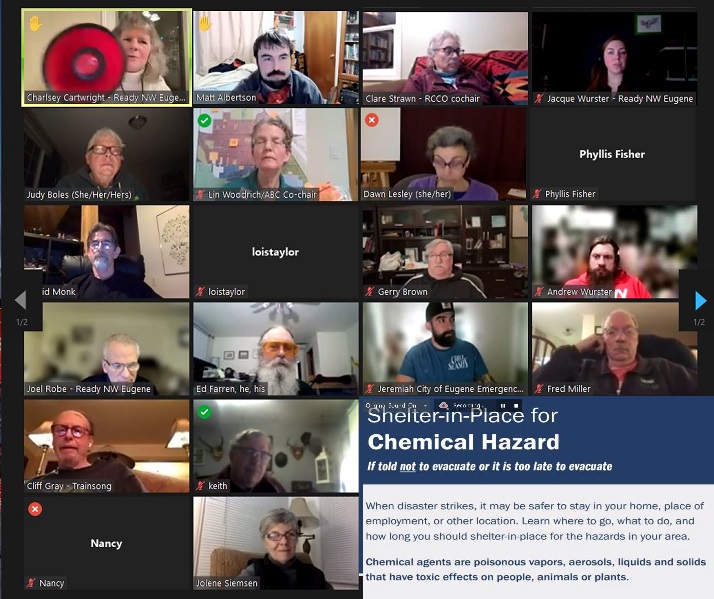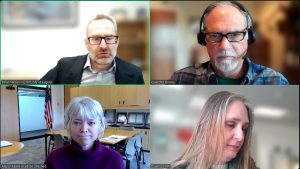River Road, Bethel, and Santa Clara team up to help neighborhood preparedness
6 min read
Ready NW presented a discussion exercise to talk about how nearby neighbors can help one another during an emergency.
Volunteers from NW Eugene created a discussion exercise for nearby neighbors. From River Road, Emergency Preparedness co-chair Jacque Wurster.
[00:00:09] Jacque Wurster: Welcome everybody to the first virtual evacuation exercise for Northwest Eugene. Our presentation tonight is hosted by Ready Northwest Eugene. And you’ll see tonight, we have Charlsey Cartwright here from River Road and myself, Jacque Wurster from River Road. We also have Lin Woodrich and Ed Farren from the Bethel community. And then Joel Robe is here from Santa Clara; we have representatives from all over Northwest Eugene here.
[00:00:36] John Q: The exercise helps neighbors sign up for emergency alerts, know their evacuation zone, and think about evacuation routes.
[00:00:44] Jacque Wurster: The role of our neighborhood emergency preparedness teams is to support our nearby neighbors as we plan, practice and improve our readiness for many types of emergencies. Tonight we’ve planned a simulated scenario of a train derailment at the rail yard here in Northwest Eugene, and there’s a chlorine gas leak that’s happening. There’ll be some neighbors that are immediately impacted and then there’ll be some neighbors that could be impacted very soon after the accident. So everybody will have to decide for themselves what’s the best course of action.
[00:01:13] John Q: Jackie said simulations can trigger powerful physical and emotional responses.
[00:01:19] Jacque Wurster: It’s normal to feel any range of emotions. So if you need to step away, if this becomes overwhelming at any point, feel free to do that and take a break and then come back to us whenever you’re ready.
[00:01:29] John Q: After emphasizing ‘This is an exercise’, David Monk.
[00:01:33] David Monk: The train derailment has occurred near Cornwall in the Northwest expressway.
[00:01:38] 911 has received multiple calls identifying greenish-yellow cloud, spreading south from the train tracks. Complaints from the callers are indicating burning eyes and nose, lung irritation, sore throats, difficulty breathing, wheezing, headaches and dizziness. The first responders have set up roadblocks to prevent drivers from entering the cloud, which is spreading slowly to the south.
[00:02:05] John Q: David Monk continued with the exercise.
[00:02:07] David Monk: The public information officers brief the media and update emergency alert system messages with recommended protective measures for the public: sheltering in place for those already within the plume; evacuation if it is safe to do so without entering the gas cloud.
[00:02:25] John Q: After describing the scenario, David Monk asked how to make sure your neighbors know about the alert.
[00:02:32] Charlsey Cartwright: On Norman Avenue where I live, we have a Map Your Neighborhood effort, and the capabilities through email and texting to alert one another. I think people are probably on different levels of preparedness for that, but we’ve talked about it and we’ve talked about the procedure in a situation of reaching out and we’ve had the dialogue about special needs.
[00:02:59] Lin Woodrich: I created a Facebook page, a private one for my street. We have a Neighborhood Watch and we also have all everyone’s phone numbers so we can alert everyone, like the phone tree, but it all depends on the power being up. So that’s a scenario or if there’s a chlorine leak and you can’t go outside, you can’t really walk down the street and, you know, help people out. So it is, it does all depend on the scenario, right?
[00:03:28] David Monk: It does. And I think most emergency response agencies—we should have as many means of notifying our nearby neighbors as possible.
[00:03:40] Fred Miller: I would probably hop on my bike and ride down the street, knocking on doors at least for five, 10 minutes. And then head northeast.
[00:03:49] David Monk: Thank you for that.
[00:03:50] Cliff Gray: That’s a good idea.
[00:03:51] David Monk: It really is. That’s a great idea. Just a quick aside, the Talent fire that just destroyed so many homes there in Southern Oregon, one of the women who lived in one of the neighborhoods in the trailer park, she was the one who noted, she was the one who was knocking on everybody’s door. The first responders, their system broke down. They chose not to put out a big alert. So really, it is amazing how many times nearby neighbors come to the rescue and really save people’s lives by, as Fred just said, getting on your bike and riding down the street, knocking on doors. Thank you.
[00:04:30] Jacque Wurster: Keith had this hand up.
[00:04:32] Keith: Yes. So at level one or two, would it make sense for me? I’ve got some emergency whistles to whistle put on my chemical gas masks. I have chemical blankets and go to advise all my neighbors before it hit level three. I know most all the neighbors.
[00:04:51] Joel Robe: Yeah, that’d be great.
[00:04:53] John Q: Matt Albertson would jump on the radio.
[00:04:55] Matt Albertson: I guess I could personally I could get on the ham radio, that would spread the word around pretty fast, to those that have the ham radio.
[00:05:03] John Q: Evacuation will be difficult in the neighborhood of Trainsong. Cliff Gray.
[00:05:08] Cliff Gray: Also, Trainsong, the fact is we are surrounded on both sides by tracks and a deep ravine and then the tracks from the other company heading west, and then a 20-foot wall, industrial wall, that extends all the way from Roosevelt until where Bethel comes back into Highway 99 up north. You know, there’s nowhere for us to go.
[00:05:33] John Q: Ready Northwest shared FEMA materials on sheltering in place.
[00:05:37] Joel Robe: Make sure that you get inside and bring your pets, any loved ones, make sure everybody gets inside. And if you have time, lock your doors and windows—that provides a better seal. But make sure you find a room that you can seal off and make sure you turn off your heat, your air conditioning, even close your fireplace damper, any place that that chlorine could get in into your house. And if you have planned ahead and in a room that you know you’re going to be in, and you’ve got some plastic and tape and you can block off, like say, if you use a bathroom, you can block off the fan. Any place gas can come in. And that’ll make it so you’re safe in that spot. And again, if you set some food, like granola bars or something that you can eat just in case, in that room too, then, it’ll just make it easier for you to stay in there.
[00:06:39] John Q: Offering advice on having a go-bag packed and ready, Lin Woodrich.
[00:06:43] Lin Woodrich: It’s important to have an emergency kit prepared ahead of time. This is one example of many that can be used as a starting point for creating your own emergency kit tailored to meet your needs. We recommend you also research other suggested lists. The content of kits may vary according to the type of emergency, length of time, and your particular needs.
[00:07:05] And I think the most important thing for a lot of people is to make sure that you have your medicine because a lot of times, you know, you’re just about out.
[00:07:15] John Q: Thia Bell added online resources and tips.
[00:07:17] Jacque Wurster: We had a tip too. I think Thia (Bell) posted it in the chat, that you can prepare to shelter at home by pre-cutting some plastic. So if you go ahead and pre-measure your windows and doors and fans and have the pieces cut, you could even label them and have tape with it that way. You’re not spending time, valuable time during the evacuation or the shelter order, trying to fit that when you’re a little bit frantic. So you can kind of pre-plan there.
[00:07:41] Joel Robe: That’s a great suggestion.
[00:07:42] John Q: Eugene Emergency Management offers materials for nearby neighbors. From the City, Jeremiah Bridges.
[00:07:49] Jeremiah Bridges: We do have resources and we can get resources for you all if you make requests, email any of us. You can email and we can find a way to get the resources to you.
[00:07:57] John Q: Northwest Eugene residents can reach out to their neighborhoods. From River Road, Charlsey Cartwright.
[00:08:03] Charlsey Cartwright: We really do want more people to be aware of this and have these kinds of conversations. It’s so informative. There’s so much collective wisdom, and we want to build our skill set. We want to be better with the use of radios and other ways of, of handling preparedness. So if you have an interest in this, some curiosity and want to join in, please do reach out.
[00:08:32] John Q: For more, contact your neighborhood association.






